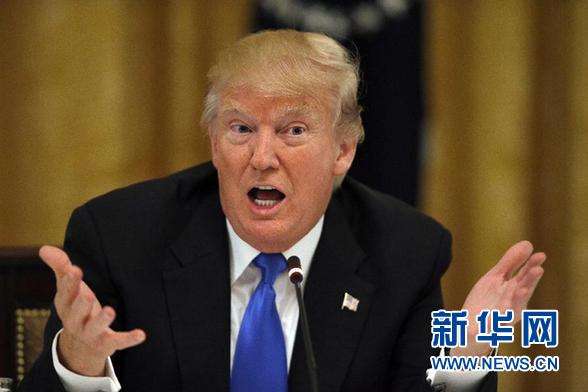Will Turkey and the US find common ground?
- By Haifa Said
 0 Comment(s)
0 Comment(s) Print
Print E-mail China.org.cn, August 19, 2018
E-mail China.org.cn, August 19, 2018

U.S. President Donald Trump [Photo/Xinhua]
Once again, Turkey-U.S. relations have plummeted to a new low; this time, it's been triggered by a dispute over Ankara's continued detention of American evangelical pastor Andrew Brunson, placed under house arrest after being jailed for 21 months.
Brunson is charged with carrying out activities linked to two anti-Turkish government organizations dubbed as terrorist by the authorities – that of Fethulla Gulen, exiled U.S.-based Muslim cleric accused of staging the 2016 failed coup against President Erdogan allegedly with American help, and the separatist Kurdish movement, the Kurdistan Workers Party (PKK).
Washington has dismissed the charges as baseless, and, during talks with the Turkish side last week, demanded the release of Brunson, and other American citizens detained in Turkey with no apparent results.
Turkish officials were reported to have demanded, in return, the extradition of Fethullah Gulen and the release of the U.S.-held Deputy CEO of Turkey's Halkbank Mehmet Hakan Atilla over charges of bypassing American sanctions against Iran with the Turkish government's alleged blessing.
Reza Zarrab, another Turkish businessman convicted in the U.S. on similar charges, and corruption cases linked to Erdogan's family, have been a thorny point in the ongoing bilateral rift.
With the failure to reach any common ground, Donald Trump imposed asset-freezing sanctions against Turkey's ministers of Interior and Justice for their role in Brunson's detention, a move that was met with a tit-for-tat measure by Ankara targeting their American counterparts.
Reports indicate that Trump is using Brunson case as a card to win evangelical Christian votes in the forthcoming mid-term elections congressional election.
However, the escalation didn't stop there. Washington threatened further "punitive measures" and announced a delay in the transfer of F-35 stealth fighter jets bought by Ankara.
Trump then upped the ante, announcing on Friday a doubling of the existing tariffs on aluminum and steel imports from Turkey – up to 20 percent and 50 percent respectively – sending the Turkish Lira plunging to a record low of almost 19 percent against the dollar and fueling financial and economic turmoil in the country.
In signs of defiance, Erdogan stressed Turkey would not bow to American "bullying" and "blackmail," considering Washington's conduct as "shameful" and "disrespectful" to a strategic partner and NATO ally and warning that Turkey would look for "new allies."
However, despite escalation, Washington and Ankara are bound together with a host of intricate issues that make discord and cooperation intertwined.
Washington's unlimited military and political support for Syrian Kurds in the fight against ISIS has put Ankara on edge for fear of giving boost to its own Kurdish population seeking separation. Ankara, nevertheless, realizes that providing military services to the U.S. in Syria could help to win the latter's favor in its fight against the Kurds.
Washington has been enraged by Turkey's tilt toward Russia, seeing Ankara joining the Astana equation on Syria with Moscow and Iran, purchasing Russian S400 missiles, and signing the TurkStream gas pipeline deal with Moscow through which the latter aims at bypassing the Ukraine pipeline supplying natural gas to Europe.
The U.S. has much interest in cooperating with Turkey to facilitate gas supplies from Azerbaijan to Europe via the TANAP pipeline parallel to the Russian one in order to break Russian monopoly of energy supplies.
Erdogan's warming towards Iran, Turkey's traditional regional rival and America's regional arch foe, also draws Washington's ire. Iran supported Turkey in the face of the allegedly U.S.-facilitated 2016 attempted coup. Ankara and Tehran pivoted closer to each other after both were targeted by Trump's regional allies, Saudi Arabia and the UAE, for taking Qatar's side in the ongoing Gulf feud.
The Turkish government's alleged involvement in helping Iran evade nuclear-linked sanctions before the American pullout of the JCPOA deal and Ankara's announced intention to continue trade with Iran after the pullout add fuel to the fire.
Tehran has already rushed to announce support for Ankara in the face of Trump's new economic sanctions.
Turkey also is forging links with China that does not appeal to America and its European allies in NATO. Erdogan openly announced that Turkey wants to join the BRICS bloc, and has recently secured a loan package worth US$3.6 billion from Chinese institutions for Turkey's energy and transportation sector.
The U.S. actually needs Turkey, which has leverage in Central Asia, in its efforts to contain China's rise on the world stage amid the repercussions of the Chinese Belt and Road Initiative.
The entangled interests between the U.S. and Turkey, with the latter holding several strategic cards in terms of its influence in the Middle East and Central Asia and its position as an energy corridor between the East and the West, make it more likely that both sides will look for common ground to build understanding.
Haifa Said is chief editor of the English Department at the Syrian Arab News Agency.
Opinion articles reflect the views of their authors, not necessarily those of China.org.cn.






Go to Forum >>0 Comment(s)